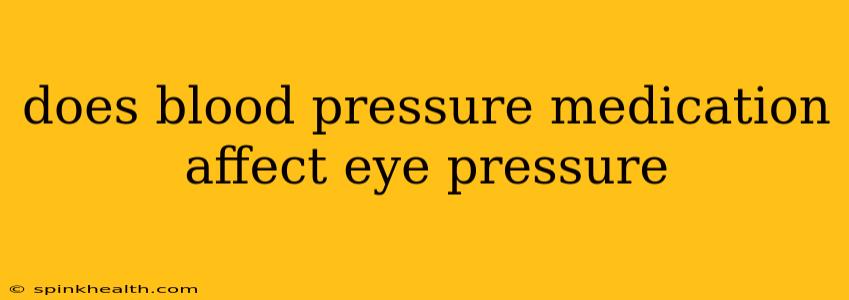Does Blood Pressure Medication Affect Eye Pressure? A Comprehensive Look
The question of whether blood pressure medication affects eye pressure is a complex one, with no simple yes or no answer. It's a story woven with threads of different medications, individual responses, and the delicate balance within our bodies. Let's unravel it together.
My name is Dr. Evelyn Reed, and I've spent over two decades specializing in ophthalmology. I've seen firsthand the intricate relationship between systemic health and eye health. Many patients ask me this crucial question, and rightly so – the health of your eyes is inextricably linked to your overall well-being.
This article delves into the intricacies of this relationship, clarifying common concerns and providing a deeper understanding. We'll explore various types of blood pressure medications and their potential effects on intraocular pressure (IOP), the pressure inside your eye.
What is Intraocular Pressure (IOP)?
Before we dive into the interaction between blood pressure medication and eye pressure, it's essential to understand what IOP is. IOP is the fluid pressure inside your eye. Maintaining healthy IOP is crucial for the health of your optic nerve and overall visual function. Elevated IOP is a primary risk factor for glaucoma, a leading cause of irreversible blindness.
Which Blood Pressure Medications Might Affect Eye Pressure?
The impact of blood pressure medication on eye pressure isn't uniform across all medications. Some classes are more likely to influence IOP than others. Let's examine some key examples:
1. Beta-Blockers: Beta-blockers, commonly used to treat high blood pressure, are a frequent point of discussion. Many beta-blockers, like timolol and betaxolol, can lower IOP. This is actually why some beta-blockers are used in eye drops to treat glaucoma. However, it's important to note that the effect on IOP from oral beta-blockers is usually less pronounced.
2. Calcium Channel Blockers: The effect of calcium channel blockers on IOP is generally considered to be minimal. While some studies suggest a possible slight increase in IOP, it's often insignificant and doesn't warrant significant concern.
3. ACE Inhibitors and ARBs: Angiotensin-converting enzyme (ACE) inhibitors and angiotensin receptor blockers (ARBs) are other common blood pressure medications. Current research shows limited evidence suggesting a substantial impact on IOP for these drug classes.
4. Thiazide Diuretics: Thiazide diuretics, while effective in lowering blood pressure, may slightly increase IOP in some individuals. This increase is usually modest, and many individuals experience no noticeable effect.
Does Blood Pressure Medication Always Raise or Lower Eye Pressure?
This is where things get interesting – the effect of blood pressure medication on IOP is highly individualized. What works for one person might not work for another. Factors such as the specific medication, dosage, individual health conditions, and pre-existing eye conditions play significant roles.
Can I Take Blood Pressure Medication If I Have Glaucoma?
If you have glaucoma, it's crucial to have open communication with both your ophthalmologist and your primary care physician. They can work collaboratively to select blood pressure medications that minimize the risk of impacting your IOP. Regular monitoring of your IOP is essential.
How is Eye Pressure Measured?
IOP is measured using a procedure called tonometry. This involves gently numbing the eye and using a specialized instrument to measure the pressure inside the eye. Your ophthalmologist can discuss this procedure with you in detail.
Should I be Worried If I'm Taking Blood Pressure Medication?
Don't panic! Many people take blood pressure medication without experiencing any significant changes in their IOP. Regular check-ups with your ophthalmologist are essential, especially if you have pre-existing eye conditions or are starting a new blood pressure medication. Open communication with your healthcare providers is key.
This information is for general educational purposes only and is not a substitute for professional medical advice. Always consult with your doctor or ophthalmologist for diagnosis and treatment of any medical condition, including high blood pressure and glaucoma. They can provide personalized advice based on your specific health history and needs. Remember, proactive care and open communication are key to maintaining healthy eyes and overall well-being.

